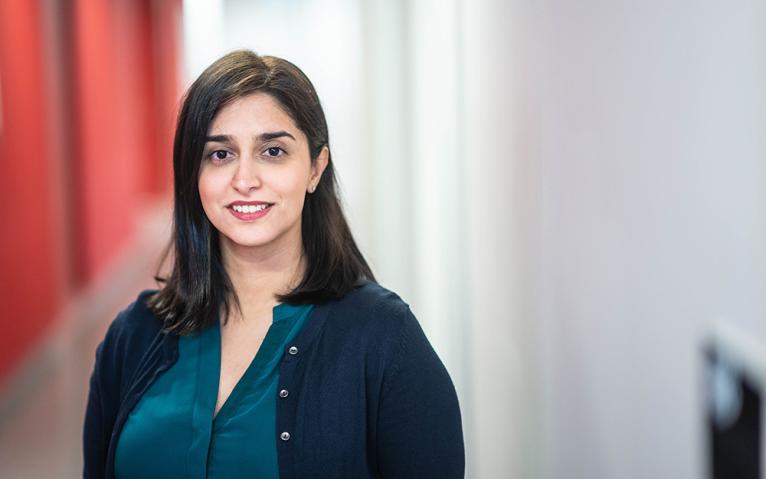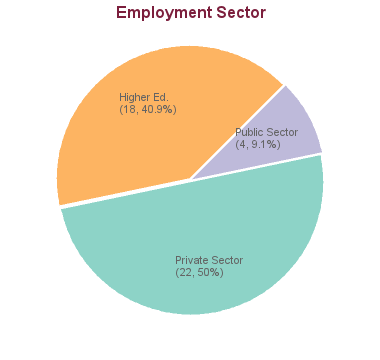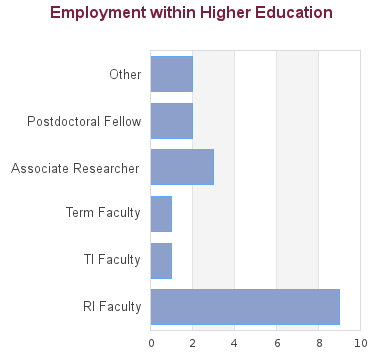
Sherry Kiafar
A few universities in Canada accepted me in their programs. I chose UBC over all of them because of its high global rank and Vancouver's lifestyle and great weather. Studying at UBC made me realize it was the right decision.

Review details about the recently announced changes to study and work permits that apply to master’s and doctoral degree students. Read more
A degree in Materials Engineering at UBC will provide you with the opportunity to join our exciting and vibrant research activities, which extend across materials extraction, materials processing, and materials performance. As a graduate student in the program, you will conduct independent and collaborative research within one of our research groupings. Researchers in the Department are actively investigating materials engineering challenges that span across the lifecycle of materials, and include a range of material systems. We have graduate students using a range of techniques and approaches, which encompass the development and application of ideas that extend the full range of theory, simulation and experiment. Research programs in our department mix fundamental know-how with real-world impact, often working directly with a range of industrial and academic partners from around the world.
Our research-intensive PhD program provides our students with the opportunity to join a well established and highly respected research program based in the heart of beautiful British Columbia, which includes internationally leading programs in electrochemistry, hydrometallurgy, physical and process metallurgy, materials characterization, biomaterials, composites, energy materials, additive manufacturing/3D printing, nanomaterials. We are growing our activities in sustainable materials and the role of materials engineering to benefit society as a whole.
The Faculty of Graduate and Postdoctoral Studies establishes the minimum admission requirements common to all applicants, usually a minimum overall average in the B+ range (76% at UBC). The graduate program that you are applying to may have additional requirements. Please review the specific requirements for applicants with credentials from institutions in:
Each program may set higher academic minimum requirements. Please review the program website carefully to understand the program requirements. Meeting the minimum requirements does not guarantee admission as it is a competitive process.
Applicants from a university outside Canada in which English is not the primary language of instruction must provide results of an English language proficiency examination as part of their application. Tests must have been taken within the last 24 months at the time of submission of your application.
Minimum requirements for the two most common English language proficiency tests to apply to this program are listed below:
Overall score requirement: 90
Reading
22
Writing
21
Speaking
21
Listening
22
Overall score requirement: 6.5
Reading
6.0
Writing
6.0
Speaking
6.0
Listening
6.0
Some programs require additional test scores such as the Graduate Record Examination (GRE) or the Graduate Management Test (GMAT). The requirements for this program are:
The GRE is not required.
Deadline to submit online application. No changes can be made to the application after submission.
Transcript DeadlineDeadline to upload scans of official transcripts through the applicant portal in support of a submitted application. Information for accessing the applicant portal will be provided after submitting an online application for admission.
Referee DeadlineDeadline for the referees identified in the application for admission to submit references. See Letters of Reference for more information.
All applicants have to submit transcripts from all past post-secondary study. Document submission requirements depend on whether your institution of study is within Canada or outside of Canada.
A minimum of three references are required for application to graduate programs at UBC. References should be requested from individuals who are prepared to provide a report on your academic ability and qualifications.
Many programs require a statement of interest, sometimes called a "statement of intent", "description of research interests" or something similar.
Students in research-based programs usually require a faculty member to function as their thesis supervisor. Please follow the instructions provided by each program whether applicants should contact faculty members.
Permanent Residents of Canada must provide a clear photocopy of both sides of the Permanent Resident card.
All applicants must complete an online application form and pay the application fee to be considered for admission to UBC.
The department offers opportunities for study in the fields of casting and solidification of metals, ceramic processes and properties, corrosion, composite material processing and properties, hydrometallurgy and electrorefining, physical metallurgy, pyrometallurgy, remelting processes, thermomechanical processing, new methods of manufacturing, materials characterization, energy materials, sustainable materials, and environmental processing.
Research Centres are: Advanced Materials Process Engineering Laboratory (AMPEL), Centre for Metallurgical Process Engineering, Clean Energy Research Centre, Electron Microscope Laboratory, MagNet - Magnesium Network.
| Fees | Canadian Citizen / Permanent Resident / Refugee / Diplomat | International |
|---|---|---|
| Application Fee | $116.25 | $168.25 |
| Tuition * | ||
| Installments per year | 3 | 3 |
| Tuition per installment | $1,875.34 | $3,294.66 |
| Tuition per year (plus annual increase, usually 2%-5%) | $5,626.02 | $9,883.98 |
| Int. Tuition Award (ITA) per year (if eligible) | $3,200.00 (-) | |
| Other Fees and Costs | ||
| Student Fees (yearly) | $1,144.10 (approx.) | |
| Costs of living | Estimate your costs of living with our interactive tool in order to start developing a financial plan for your graduate studies. | |
Applicants to UBC have access to a variety of funding options, including merit-based (i.e. based on your academic performance) and need-based (i.e. based on your financial situation) opportunities.
From September 2024 all full-time students in UBC-Vancouver PhD programs will be provided with a funding package of at least $24,000 for each of the first four years of their PhD. The funding package may consist of any combination of internal or external awards, teaching-related work, research assistantships, and graduate academic assistantships. Please note that many graduate programs provide funding packages that are substantially greater than $24,000 per year. Please check with your prospective graduate program for specific details of the funding provided to its PhD students.
All applicants are encouraged to review the awards listing to identify potential opportunities to fund their graduate education. The database lists merit-based scholarships and awards and allows for filtering by various criteria, such as domestic vs. international or degree level.
Many professors are able to provide Research Assistantships (GRA) from their research grants to support full-time graduate students studying under their supervision. The duties constitute part of the student's graduate degree requirements. A Graduate Research Assistantship is considered a form of fellowship for a period of graduate study and is therefore not covered by a collective agreement. Stipends vary widely, and are dependent on the field of study and the type of research grant from which the assistantship is being funded.
Graduate programs may have Teaching Assistantships available for registered full-time graduate students. Full teaching assistantships involve 12 hours work per week in preparation, lecturing, or laboratory instruction although many graduate programs offer partial TA appointments at less than 12 hours per week. Teaching assistantship rates are set by collective bargaining between the University and the Teaching Assistants' Union.
Academic Assistantships are employment opportunities to perform work that is relevant to the university or to an individual faculty member, but not to support the student’s graduate research and thesis. Wages are considered regular earnings and when paid monthly, include vacation pay.
Canadian and US applicants may qualify for governmental loans to finance their studies. Please review eligibility and types of loans.
All students may be able to access private sector or bank loans.
Many foreign governments provide support to their citizens in pursuing education abroad. International applicants should check the various governmental resources in their home country, such as the Department of Education, for available scholarships.
The possibility to pursue work to supplement income may depend on the demands the program has on students. It should be carefully weighed if work leads to prolonged program durations or whether work placements can be meaningfully embedded into a program.
International students enrolled as full-time students with a valid study permit can work on campus for unlimited hours and work off-campus for no more than 24 hours a week during academic sessions.
A good starting point to explore student jobs is the UBC Work Learn program or a Co-Op placement.
Students with taxable income in Canada may be able to claim federal or provincial tax credits.
Canadian residents with RRSP accounts may be able to use the Lifelong Learning Plan (LLP) which allows students to withdraw amounts from their registered retirement savings plan (RRSPs) to finance full-time training or education for themselves or their partner.
Please review Filing taxes in Canada on the student services website for more information.
Applicants have access to the cost estimator to develop a financial plan that takes into account various income sources and expenses.
52 students graduated between 2005 and 2013: 1 graduate is seeking employment; for 7 we have no data (based on research conducted between Feb-May 2016). For the remaining 44 graduates:


These statistics show data for the Doctor of Philosophy in Materials Engineering (PhD). Data are separated for each degree program combination. You may view data for other degree options in the respective program profile.
| 2023 | 2022 | 2021 | 2020 | 2019 | |
|---|---|---|---|---|---|
| Applications | 42 | 36 | 44 | 39 | 45 |
| Offers | 9 | 11 | 13 | 8 | 7 |
| New Registrations | 6 | 8 | 12 | 6 | 5 |
| Total Enrolment | 49 | 55 | 61 | 53 | 60 |
Students in research-based programs usually require a faculty member to function as their thesis supervisor. Please follow the instructions provided by each program whether applicants should contact faculty members.
These videos contain some general advice from faculty across UBC on finding and reaching out to a supervisor. They are not program specific.
This list shows faculty members with full supervisory privileges who are affiliated with this program. It is not a comprehensive list of all potential supervisors as faculty from other programs or faculty members without full supervisory privileges can request approvals to supervise graduate students in this program.
| Year | Citation |
|---|---|
| 2024 | Dr. Hasan studied the electrodeposition, corrosion, and catalytic behavior of molybdenum coatings. Despite the challenges associated with molybdenum and water, the work has produced nanostructured molybdenum coatings which demonstrates good corrosion resistance and catalytic performance. |
| 2024 | Dr. Wu explored composite nanofibers for creating smart and flexible yarns that can generate electrical signals in response to mechanical and optical stimuli. The yarns can be assembled into electronic textiles for sensing body movement or identifying intense light exposure. |
| 2024 | Dr. Zhao investigated monolithic integration of vertical-cavity surface-emitting lasers (VCSELs) on Si and Ge substrates. Successful VCSEL epitaxy on engineered Ge substrates has been illustrated with strong performance. Industry companies can use this study much more readily to adopt this technology. |
| 2024 | Dr. Bakhshi advanced understanding of tack in carbon fiber composites during automated deposition processes by creating a simulator system, developing new characterization methods, and integrating novel sensors with high-resolution X-ray CT and numerical simulation. This enhances insights into material behavior, process, and manufacturing outcomes. |
| 2024 | Dr. Arbabi developed a new approach to model the small-scale behavior of composite materials during manufacturing processes. This model empowers composite manufacturing companies to have better control over the processes, thereby facilitating the production of defect-free, lightweight structures. |
| 2024 | Dr. Pourabdollah developed a series of sophisticated numerical models for predicting the thermomechanical response of components produced using metal additive manufacturing, allowing for directly fabricating components from a digital file. The work contributes to improvements in the geometric tolerances that can be achieved with the process. |
| 2023 | Dr. Badawy developed a smart fabric made by growing Zinc oxide nano-wires on yarns. This smart fabric can record in real-time applied deformation and identify its location and magnitude. It can be used in the health care system to improve the diagnosis process, create treatment plans, and monitor patients' health conditions during a hospital stay. |
| 2023 | Dr. Krishnamoorthy estimated how a catalytic solute is distributed when applied to columns of low-grade copper ore. This work helps in optimizing a novel catalytic leach technology developed in UBC to liberate copper from primary copper sulfide ores such as chalcopyrite. |
| 2023 | Dr. Soltani examined the behavior of materials at the atomistic scale. He used computer simulation of atoms and machine learning algorithms to understand how the dynamic processes derive the evolution of micro-structure of materials and how these processes determine the properties of materials like glasses and metals. |
| 2023 | Dr. Romualdi investigated the effect of chemical composition and thermal cycles on the weld heat affected zone of line pipe steels as a critical aspect of pipeline integrity that will remain significant for future applications including carbon capture and a hydrogen fuel energy matrix. |
Materials Engineering offers opportunities for study in the following fields: casting and solidification of metals; ceramic processing and properties; refractories; corrosion; composites; high temperature coatings; biomaterials; extractive metallurgy including hydrometallurgy, bio-hydrometallurgy, electrometallurgy, and pyrometallurgy; physical metallurgy; thermo-mechanical processing related to materials production; environmental issues related to materials productions; electronic materials; nanofibers; textile structural composites.
Materials Engineers are experts on the entire life cycle of materials, including recovery of materials from minerals, making engineered materials, manufacturing materials into products, understanding and evaluating materials performance, proper disposal and recycling of materials, and evaluating societal and economic benefits.
Departments/Programs may update graduate degree program details through the Faculty & Staff portal. To update contact details for application inquiries, please use this form.

Take a break from studying with opportunities at your fingertips. Whether you want to settle down in a café or take your research outdoors, we have a place for you.